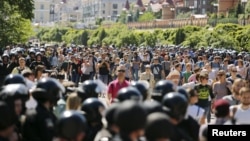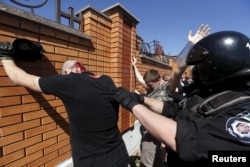As members of the LGBT community in the United States celebrate the Supreme Court ruling that legalized same-sex marriages nationwide, gay-rights activists in Ukraine say they fear their country is headed in the opposite direction.
They point to last month's LGBT Equality March in Kyiv — the first since the Euromaidan protests that led to the ouster of a pro-Russia government and brought in a government that pledges to lead the country based on Western values of liberal democracy, tolerance and human rights.
After the march ended, scores of people attacked participants; a dozen participants and several police officers were seriously hurt.
"There were at least a couple hundred attackers," said Maxim Eristavi, a gay Ukrainian journalist. He said many of them came from right-wing nationalist groups.
Eristavi said it was "easy to trace back that the calls to gather those groups" were led by the Right Sector, a leading right-wing nationalist party, and another group, the Organization of the Ukrainian Nationalist-Ukrainian Rebel Army.
Another marcher, Yuri Yoursky, project officer with the Gay Alliance Ukraine, agreed. "The attackers were right-wing radicals, the representatives of the Right Sector, plus representatives of a certain group, Smerch, and nationalists who promote traditional family values," he said.
In a Facebook message, Right Sector's spokesman, Artem Skoropadsky, denied his group had taken part in the violence, although ahead of the march, the Right Sector's leadership criticized the march as being evil.
"If the law was violated by anyone, the law enforcement should figure it out," he said. "We'll judge every person separately and based on the evidence presented."
Doubts about police
Activists question the police commitment to keeping LGBT activists safe.
Although almost 30 attackers were arrested — most identified as belonging to nationalist groups — police have yet to bring all of the suspects to court.
LGBT activists doubt the official investigation will yield results. Olena Shevchenko, who co-organized Kyiv Pride in previous years, suspected that law enforcement might be complicit in the attacks.
"It was the police that suggested a new location for the march at the last minute,” Shevchenko told VOA via Facebook. "We see the same situation each year — the far-right somehow always gets information about the location of the march despite last-minute changes.
They also got to the place right on time. So we witness a situation where many LGBT persons and supporters have no idea about the event location, but the far right are well-informed."
Another activist at the march confirmed to VOA that the police "wouldn't let the participants use the [originally] agreed-upon evacuation route and basically directed them straight toward the aggressive-right groups."
Police spokeswoman Yulia Mustash dismissed the possibility that law enforcement would provide information to attackers.
"I don't even know how to comment on this," she said. "It's just a case of someone making unsubstantiated assumptions and suspecting something."
Media coverage of the attack left many activists doubting that Ukrainian journalists would investigate what took place, Shevchenko said. That is partly because of the role nationalist groups have played in the Euromaidan protests and the war against pro-Russian separatists.
"We saw many speculations on ‘nationalism and traditional values’ as well as on the war in eastern Ukraine instead of coverage in a human rights direction," Shevchenko said.
She suggested that biased coverage of the Equality March contributed to public confusion about the event and might have fostered sympathy for the attackers.
"Many expected the nationalists from the Right Sector, who are considered heroes, to come to the rally. But once they saw them attacking a peaceful assembly, they chose to be in denial. They just don't want to believe this," Shevchenko said.
Some of the coverage managed to omit that LGBT activists were the targets, said Anna Sharyhina, one of the march organizers.
"Most journalists covering the attacks provided information about the attackers and wounded policemen, effectively turning the event into a confrontation between the government and the right," Sharyhina told VOA via email. "This completely negates the real meaning of the event and its main message: that human rights issues are always current events."
Euromaidan and the future
The violence against LGBT and human rights marchers in Kyiv has led LGBT activists to reflect on the events of the Euromaidan protests.
"Euromaidan brought significant political and social change but failed to change the perception and attitude of society toward the LGBT community," said Gay Alliance Ukraine's Yoursky.
Euromaidan and the war in eastern Ukraine have fueled support for "far-right organizations, which have carried out attacks on members of the LGBT community in the past," Yoursky said. "These events also triggered the growth of aggression in society and increased the tolerance of violence.”
He said he expected that as war rages on, Ukraine's government will choose to preserve the popular image of the infallibility of its front-line defenders — of which the far-right forms a small but ideologically coherent part — at the expense of those targeted by hate groups.
Ukraine's hate crime legislation is a particular concern for the country's LGBT activists.
Anti-gay violence is on the rise in Ukraine, said Serhiy Ponomaryov, deputy head of the Department for Non-Discrimination and Gender Equality in the office of the Ukrainian Parliament Commissioner for Human Rights.
In the first six months of this year, there were six incidents, not including the attack at the march, Ponomaryov said.
He told VOA that a spike in anti-LGBT crimes began last year, but there's no consistent effort to amend the criminal code, which does not consider anti-gay attacks to be hate crimes.
Government silence expected
Almost a month has passed since the equality march, and Ponomaryov said he didn't expect the government to make any statements about the violence.
"There's currently an investigation under way," he said. "Regarding the office of the Ukrainian Parliament Commissioner for Human Rights, we decided that we will step in and voice our concerns if we see attempts to sweep the investigation under the carpet."
In a poll conducted in 2013, 79 percent of Ukrainians vehemently opposed any sexual relations between members of the same sex; 16 percent said they did not support same-sex marriage but thought that same-sex couples should have the right to live in a civil union; and 40 percent said that homosexuality ran against religious norms.
The poll did contain some positive news for LGBT activists and supporters: Same-sex marriage was looked upon most favorably among those under age 29, as well as among residents of Ukraine's capital and the country's other large cities. College-educated Ukrainians also appeared more likely to support the civil union rights for same-sex couples.
The same demographic of young, educated urbanites was the major force behind the Euromaidan protests, and has also been behind the current push for political reform.





